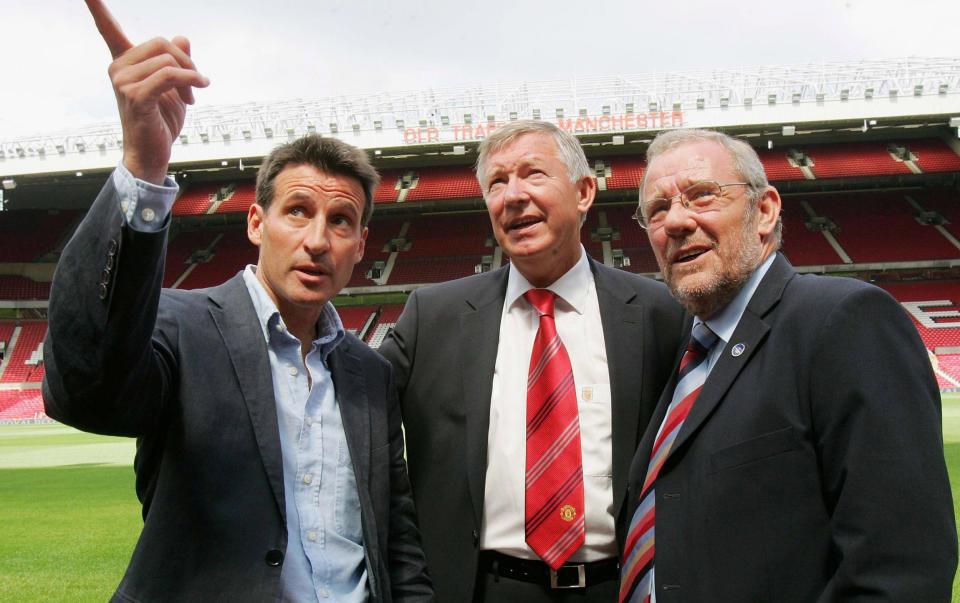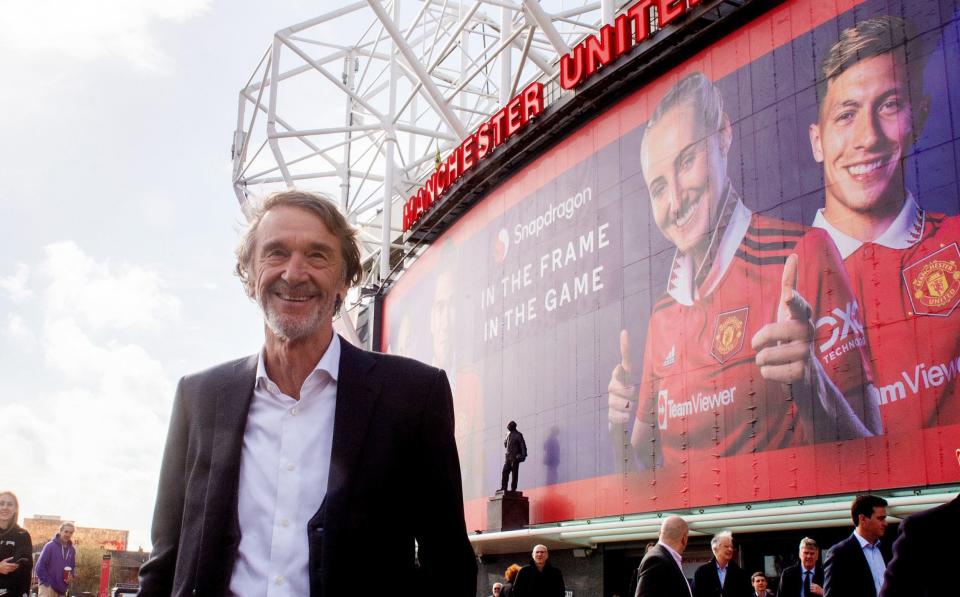Seb Coe to head Man Utd’s new stadium task force with Andy Burnham and Gary Neville

Sebastian Coe will spearhead a special task force to explore a “once-in-a-century opportunity” to create a new stadium for Manchester United as the centre-piece of a wider regeneration project of the Old Trafford area.
The so-called Old Trafford Regeneration Task Force will be chaired by Lord Coe, the former head of the organising committee for the 2012 London Olympics, and also comprise former United captain Gary Neville and Andy Burnham, the Mayor of Greater Manchester.
Telegraph Sport revealed last month how Sir Jim Ratcliffe wants to create the Wembley of the North under bold plans for a spectacular new home for United and could seek to lobby the Government for funds.
Ratcliffe has convened the 10-strong taskforce to fully examine how a world-leading new stadium could support wider renewal of the area surrounding United’s current Old Trafford home and drive social and economic improvements for the entire region.

The Ineos founder – who has been given complete control of football operations at Old Trafford as part of his £1.03 billion deal for a 27.7 per cent stake in the club – believes Coe’s experience of helping to deliver the London Olympics could prove invaluable as United consider a project of regional, national and international significance.
“Throughout my career in sport, I have seen the potential for stadiums to become focal points for strong communities and catalysts for social and economic development,” said Lord Coe, who is a lifelong Chelsea fan.
“That was certainly true of the venues we built in east London for the 2012 Olympics, and we are overdue a project of similar scale and ambition in the north of England.
“I am honoured to have this opportunity to share my experience in support of this tremendously exciting project.”
Ratcliffe is understood to have analysed the option to redevelop United’s current Old Trafford home or build a new stadium on adjacent land. Sources have indicated that his initial conclusion is that a new build would be “the best way to truly transform the fan experience and surrounding community”, a vision the club’s board are supportive of a task force now exploring.
“This can be a major regeneration project for an area of Greater Manchester which has played such a key role in British industrial history but which today requires new investment to thrive again,” Ratcliffe said.
“The north west of England has a greater concentration of major football clubs than anywhere else in the world yet we don’t have a stadium on the scale of Wembley, the Nou Camp or Bernabeu. We will not be able to change that on our own, which is why this task force is important to help us seize this once-in-a-century opportunity”.
In addition to Coe, Burnham and Neville, the joint task force will also feature Trafford council chief executive Sara Todd, the chief executive of the Manchester United Supporters’ Trust (MUST) Duncan Drasdo and other prominent civic and community leaders.
These include Tom Ross, leader of Trafford council, Eamonn Boylan, chief executive of the Greater Manchester Combined Authority and Transport for Greater Manchester, Anna Bensky, associate director of The Peel Group, Dame Nancy Rothwell, president and vice-chancellor of the University of Manchester and Malcolm Press, Vice-Chancellor of Manchester Metropolitan University.
The task force is expected to make recommendations later this year with Ratcliffe keen to ensure no time is wasted.

An economic impact study will be commissioned to assess the potential socio-economic benefits of the projects and fans and local residents will be closely consulted throughout the process. A total of 30,000 fans have already been surveyed on the future of Old Trafford.
The taskforce will also look into financing options for the stadium given the view that, while the club has the capacity to arrange its own financing for a phased redevelopment of Old Trafford, a new build and wider regeneration project would require support from funding partners.
Ineos has experience of financing major infrastructure projects and a wide variety of potential funding sources will be explored. Sources said the club were not looking for “handouts” but could tap into opportunities for public-private partnerships to unlock investment benefits for the community and make the stadium a driver for wider regeneration around transport infrastructure, amenities and mixed income housing among other things.
Ratcliffe wants the taskforce to assess the feasibility of a new stadium of national significance that is equipped to host international games and finals and serve as a direct complement to Wembley in the south at the same time as providing a new state of the art home for United.
Trafford council has already announced separate plans to revamp the area surrounding Old Trafford in the Trafford Wharfside Framework. But United want to work in synergy with that project to support regeneration of the area between Trafford Park and the banks of Salford Quays and back the “Levelling Up” agenda to drive investment in the North of England.
“The development of one of the most iconic stadiums in world football will help attract investment, create jobs and lead to new opportunities that will not just benefit Trafford but communities across our city-region and beyond,” Burnham said.
“Greater Manchester has been a hive of innovation and creativity for centuries and sport has played a huge role in shaping our past and present. This bold and exciting vision for the future of Old Trafford and the surrounding area can become another success story for our region.”
Neville – a prominent business leader in Manchester as well as being a former United player – echoed Burnham’s sentiments. “I’m incredibly fortunate to have had the privilege of playing hundreds of games at Old Trafford and no one can take away those amazing memories,” he said.
“But Old Trafford has evolved throughout its history and it’s clear we are at a point where it has to change again to ensure that Manchester United has a world-class stadium befitting the world’s greatest club.
“While I want the best for Manchester United, I also want the same for the surrounding community. Old Trafford should be a stadium that the whole of Greater Manchester can take pride in and be a catalyst for sustainable, cohesive growth in an area of the city that has been neglected for too long.
Ratcliffe feels north has been neglected for too long
Ratcliffe spoke last month about his wish to redress the imbalance in the country given that the south lays claim to the majority of England’s national venues.
“The people in the north pay their taxes like the people in the south pay their taxes,” he added. “But where’s the national stadium for football? It’s in the south? Where’s the national stadium for rugby? It’s in the south. Where’s the national stadium for tennis? It’s in the south. Where’s the national concert stadium? It’s the O2, it’s in the south. Where’s the Olympic Village? It’s in the south.
“All of this talk about Levelling Up and the Northern Powerhouse. Where is the stadium in the north? How many Champions Leagues has the north-west won and how many Champions Leagues has London won? The answer to that is the north-west has won 10 – Liverpool have won more than us – and London has won two. Where do you have to go if you get to the semi-final of the FA Cup and you’re a northern club? You have to schlep down to London, don’t you? So what happened to HS2, which was going to be a substantial amount of investment in the north, what happened to that? They cancelled that. And where are they going to spend that?
“They’re going to spend it on the rail network in London. People in the north pay their taxes and there is an argument you could think about a more ambitious project in the north which would be fitting for England, for the Champions League final or the FA Cup final and acted as a catalyst to regenerate southern Manchester, which has got quite significant history in the UK.”